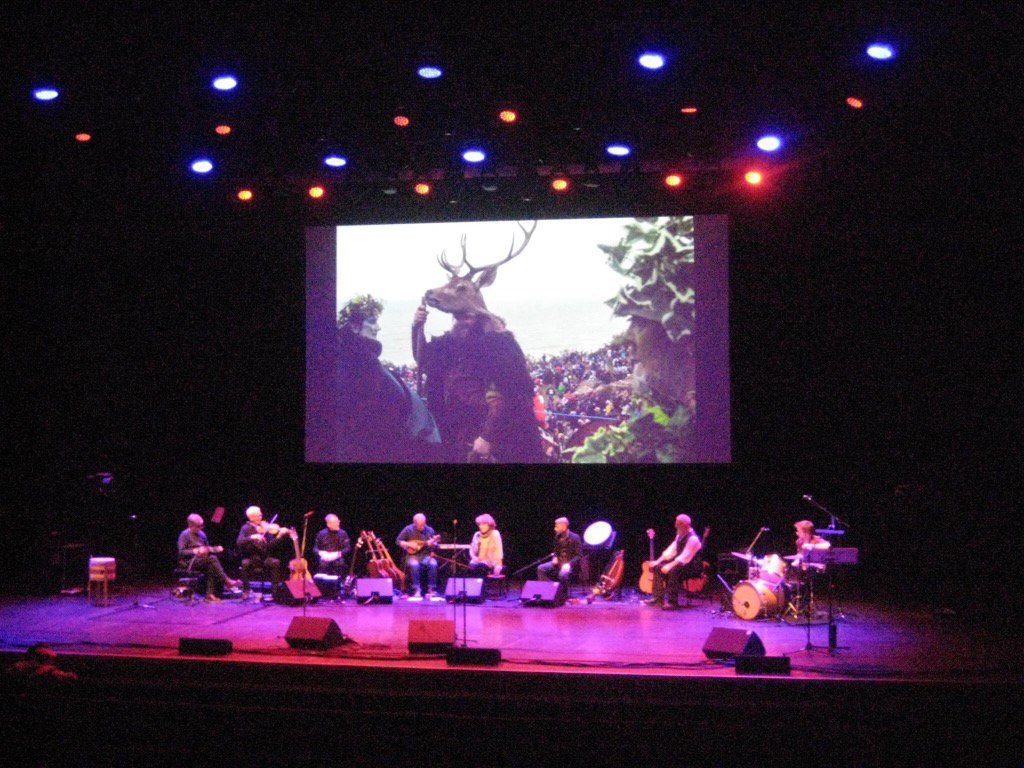Shirley Collins – Live @ The Barbican
aaamusic | On 20, Feb 2017
Saturday 18th February, London
Tonight’s event at the Barbican was divided into two parts. The first, which lasted for about an hour, saw a host of friends, musicians and collaborators – including Dave Arthur, Peter Cooper, Alasdair Roberts, John Kirkpatrick, Graham Coxon, Lisa Knapp and Olivia Chaney – take to the stage to perform a series of songs. The majority of these musicians opted to play one of Shirley Collins’ numbers and one of their own. In so doing, they not only paid tribute to Collins’ work and her influences but also showed how it had been an important influence on their work.
Dave Arthur and Peter Cooper, both of whom would return to play with Collins, opened the set playing a song that – appropriately, given Collins’ research – had undergone a series of transformations traveling from the UK to the US, and back again. This was succeeded by a wonderful fiddle and banjo number. John Kirkpatrick, one of The Sultans of Squeeze, followed playing ‘The Captain With The Whiskers’. Collins released this song, which combines traditional lyrics with music that she had to create to accompany it, on the album Snapshots. Next up was Lisa Knapp who, illuminated in pink light, gave a brilliant rendition of ‘Polly On The Shore’, which Collins’ released on Love Death and the Lady.
Alasdair Roberts followed and played a number by himself before being joined by Olivia Chaney to play a song from Dundee about a woman who was burnt at the stake for engaging in the wrong type of love affair. This was a sharp, stark reminder of the often brutal and violent social content that much folk music gives cultural expression to. This was further evidenced by many of the songs in the second half of the evening, which were played by Collins and her band. Chaney then took to a Yamaha keyboard to play a song recorded by Shirley and her sister, Dolly Collins, with whom she made albums in the 1970s. The song, Chaney made clear, was inspirational for her because of the way it combined aspects of distinct genres that she was interested in. This first section of the evening ended with Graham Coxon. He opened by playing ‘The Cruel Mother’, a song that featured on Collins’ 1960 LP False True Lovers. He followed this with a rendition of his own song, ‘Sorrow’s Army’.
Here it is important to say that in 1981 Collins developed a form of dysphonia, which resulted in her losing her singing voice. Her career as a performer sadly – and irreversibly, it seemed – came to an end. In the first half of the evening, all of Collins’ songs, which were performed by the aforementioned guests and collaborators, were taken from her albums released before this point. The second half of tonight’s concert saw Collins, together with her excellent band, perform Loadstar – the singers’ first studio album in 38 years, which was released in 2016. It is worth remembering that as recently as 2015 Collins insisted – despite her now legendary appearance at Union Chapel in 2014 (as part of Current 93) – that performing her own music again was never going to happen. Tonight’s concert is testament to the fact that Collins is a survivor and her work, both as a performer and musicologist, is concerned with survival, the survival of songs.
There was much hype and, understandably, anticipation about this special performance. But when Collins took to the stage, she was both reserved and modest. In fact, it seemed that, despite her own incredible return to performing live music – against all the odds – tonight was much more about the songs than Collins herself. Pip Barnes, who, at different moments in the evening sang and played instruments, was the compare/MC for the evening. Both he and Collins explained the history of different songs, and the transitions and transformations they had undergone.
Collins opened with ‘Awake Awake’, a song from 1580. It is about the great earthquake of London that rocks the city. The songwriter – a religious zealot – urges others to pray, “Let us pray, and to the living Lord let us pray”. The projected film behind the musicians, which was by Nick Abrahams – well known for his films and brilliant art projects, like The Bruce Lacey Experience – featured a crowd walking with lit torches and scenes of ritual burning (probably from Lewes bonfire night). Here Ossian Brown played wonderful split components on the hurry-gurdy together with Alex Neilson’s percussion. This transitioned into May Carol, which was followed by some Morris dancers.
From religious zealotry to ‘Cruel Lincoln’ – a song about revenge, repayment and blood, accompanied by the soft strings of Dave Arthur. Next up, a beautiful song about a grave for an unknown sailor in a church in Sussex. Collins then played ‘Death and the Lady’, previously recorded with her sister, Dolly, in the 1970s. Sliding strings accompany the troubling story of a woman pleading with Death for a few years more of life.
The next song, ‘Pretty Polly’, was one that she first encountered in her 1959 song-collecting trip across the US with field recordist Alan Lomax. This trip was intended to save traditional songs – which were sung by ordinary, working people – from being forgotten. This particular song, she explained, was from Arkansas. Its performance was accompanied by a film of a toy-theatre, which inventively illustrated the different scenes in the narrative unfolding in the song. Tonight’s concert was remarkable not only because of Shirley Collins and her band’s brilliant performance, but also because it took us on a historical journey across the centuries.


